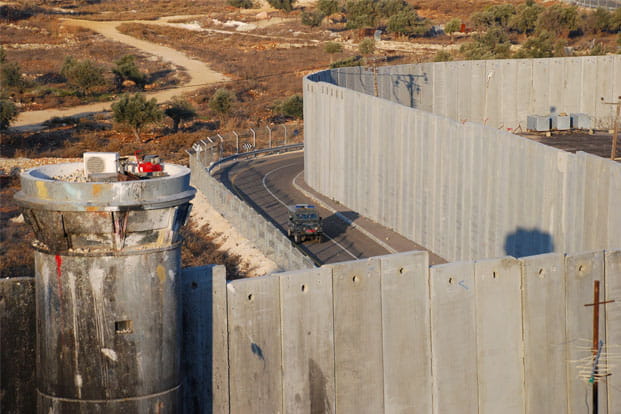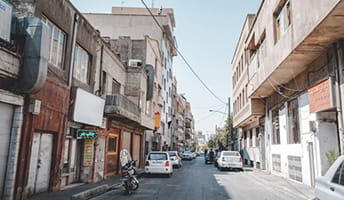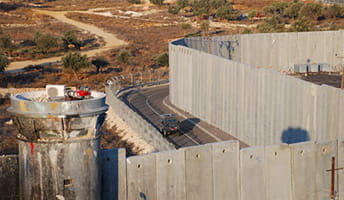
This month's security bulletin focuses on:
- Iran
- Israel/Palestine
- Domestic Terror Threat
- Elections – Tajik 1 Mar
– Bolivian 3 May
– Burundi 20 May
- Novel Coronavirus
Iran
 2020 started with controversy with the US killing Iranian General Qasem Soleimani on 3 January. Soleimani, as the commander of the Quds Force, was responsible for operations outside of Iran, specialising in intelligence and unconventional warfare. The US stated that he had authorised the attacks against the US embassy that commenced on 31 January 2019 and was planning further actions aimed at US diplomats in the country. A rocket attack against the K-1 Air base on 27 December in which an American civilian contractor was killed, four US and 2 Iraqi service personnel were injured has also been cited as a contributing factor in the decision to target Soleimani directly.
2020 started with controversy with the US killing Iranian General Qasem Soleimani on 3 January. Soleimani, as the commander of the Quds Force, was responsible for operations outside of Iran, specialising in intelligence and unconventional warfare. The US stated that he had authorised the attacks against the US embassy that commenced on 31 January 2019 and was planning further actions aimed at US diplomats in the country. A rocket attack against the K-1 Air base on 27 December in which an American civilian contractor was killed, four US and 2 Iraqi service personnel were injured has also been cited as a contributing factor in the decision to target Soleimani directly.
Initial reaction from the international community was concern that this was a serious escalation and Iran would have to respond in a robust manner, leading to further deterioration. However it soon became apparent that Iran’s response (missile attacks against US targets in Iraq on 8 January) was one to allow them to show strength domestically – US sources going as far as to comment that the missile strikes on sites in Iraq had been targeted to minimise the chance of US casualties.
Regardless of this, the killing of Soleimani by a foreign power could have had the effect of shoring up support for a regime that has been beset by internal problems. There had been very little international coverage of on-going anti-government protests, although the funeral of Soleimani and attendance figures were quickly reported on. It may have been that given time the Iranian government could have got extra mileage from the situation on the home front. However, in a tragic twist Islamic Republican Guard forces shot down a Ukrainian International Airways plane (flight 752) on 8 January shortly after the retaliatory cruise missiles had been launched. All 176 passengers and crew were killed. After initial attempts to deny they were responsible video footage was sourced that showed the aircraft being shot down. The perceived government’s deception led to mass protests against Supreme Leader Ali Khamenei.
There are planned legislative elections for late February and whilst the protest following the downing of Flight 752 have dissipated the polls could be impetus for a renewal of unrest. Additionally, the aspirations of Iran to develop the “Shia Crescent” and the burden of US sanctions means that tensions within the regime remain and can potentially be exploited to distract from home-grown issues.
Israel/Palestine
 Staying in the Middle East the situation in Israel and the Palestinian territories seems to be slightly more tense than usual. Hamas and the Israeli Defence Force (IDF) have been sporadically exchanging fire, most recently over the weekend of 31 January to 2 February. Attacks from the strip have been more frequent of late, leading to the Israeli Defence ministry announcing it was stopping cement imports as a further punitive measure. This is all occurring to the back drop of the release of President Trump’s “Peace to Prosperity: A vision to improve the lives of Palestinian and Israeli people” (Trump’s Peace Plan), which was unveiled on Thursday 28 January at a press conference during which Prime Minister Netanyahu disclosed plans for the immediate annexation of the Jordan Valley and West Bank settlements. It is fair to say that the plan was not well received by Palestinians leading to the Palestinian Authority cutting all ties (including security relations) with Israel and the US on 1 February.
Staying in the Middle East the situation in Israel and the Palestinian territories seems to be slightly more tense than usual. Hamas and the Israeli Defence Force (IDF) have been sporadically exchanging fire, most recently over the weekend of 31 January to 2 February. Attacks from the strip have been more frequent of late, leading to the Israeli Defence ministry announcing it was stopping cement imports as a further punitive measure. This is all occurring to the back drop of the release of President Trump’s “Peace to Prosperity: A vision to improve the lives of Palestinian and Israeli people” (Trump’s Peace Plan), which was unveiled on Thursday 28 January at a press conference during which Prime Minister Netanyahu disclosed plans for the immediate annexation of the Jordan Valley and West Bank settlements. It is fair to say that the plan was not well received by Palestinians leading to the Palestinian Authority cutting all ties (including security relations) with Israel and the US on 1 February.
Whilst the US’s position on the annexation may not be fully settled there can be no doubt that regionally the plan has not been well received and has caused tensions to be exacerbated. The full ramifications and whether the plan will amount to anything remain to be seen. But in the meantime, travel to Israel should be taken with the current, more volatile (than usual) situation in mind.
Domestic Terror Threat
 On Sunday 2 February Sudesh Amman was shot dead by Police Officers after stabbing two members of the public in Streatham, London UK. Amman was a convicted terrorist who had been released, in line with existing guidelines, halfway through his sentence. The authorities were so concerned about him he was under covert surveillance by Anti-Terror Police Officers. A fact which led to him being shot within eight seconds of starting his attack.
On Sunday 2 February Sudesh Amman was shot dead by Police Officers after stabbing two members of the public in Streatham, London UK. Amman was a convicted terrorist who had been released, in line with existing guidelines, halfway through his sentence. The authorities were so concerned about him he was under covert surveillance by Anti-Terror Police Officers. A fact which led to him being shot within eight seconds of starting his attack.
Wearing a fake-suicide vest the incident almost seems to be a case of “death-by-cop” but highlights the problem of radicalised individuals being released onto the streets of the UK whilst still a danger. A spectre that has already raised its head in the UK with the Fishmonger Hall attack in early December in London.
Whilst this may be a peculiarity of the UK’s rules and procedures there can be no doubt that the threat of attacks exists across the globe – especially when taking into account the potential of returning jihadists from Syria, or other Islamist conflict areas around the world, to their home countries.
This should of course be considered in light of the actual chances of being involved in a terrorist incident – which are vanishingly small and reassuring people that travel can continue. It is also a reminder that as we move into this new decade the risk and threat landscape remains the same, we still have to ensure that we, and those we are sending on business travel, are well prepared, understand the context of the area they are going to and the dangers we/they may face (in relation to our/their individual profile and trip purpose). We should know what support is available to us and if responsible for travel be confident that there is the appropriate level of support in place and that it is well understood by the travelling population.
Elections
 There are, as always, several elections planned this year and some of them may be contentious – lead to unrest and protests which can affect business travel. This can be from the prosaic difficulty in arranging meetings or logistics in country, to having plans disrupted due to demonstrations, up to potentially having to evacuate a country if serious conflict develops. I have already mentioned the legislative elections in Iran but there are a couple of others that jump out at me as being of interest. Tajikistan is holding a parliamentary elections on 1 March. It is unlikely that there will be any major upsets due to the Rahmon family’s grip on power and the security forces tightly control any demonstrations, however there can be ‘flash mob’ type protests that occur with no warning. For the time being having contingency plans in place and monitoring the build up are recommended.
There are, as always, several elections planned this year and some of them may be contentious – lead to unrest and protests which can affect business travel. This can be from the prosaic difficulty in arranging meetings or logistics in country, to having plans disrupted due to demonstrations, up to potentially having to evacuate a country if serious conflict develops. I have already mentioned the legislative elections in Iran but there are a couple of others that jump out at me as being of interest. Tajikistan is holding a parliamentary elections on 1 March. It is unlikely that there will be any major upsets due to the Rahmon family’s grip on power and the security forces tightly control any demonstrations, however there can be ‘flash mob’ type protests that occur with no warning. For the time being having contingency plans in place and monitoring the build up are recommended.
Looking slightly further out there are the Bolivian elections on 3 May and the Burundi elections on 20 May. Bolivia underwent a major upheaval towards the end of 2019 following protests against the elections in October, resulting in Morales (who had been in power since 2006) resigning following pressure from the military and police. As we enter the run up staying abreast of the situation and having key decision points mapped out will help to respond to any developments.
Burundi has been in a state of political turmoil since Nkurunziza’s decision to run for a third term in 2015, so these elections could act as a focal point for the continuing demonstrations. As for Bolivia monitor the situation and map out how you would respond to any developments.
Coronavirus
As far as ongoing issues affecting travel and especially business travel you can’t get away from Coronavirus, especially if you have any travel heading towards Asiapac. My colleague Dr Simon Worrell, our Global Medical Director is providing frequent updates on this which you can read here.







